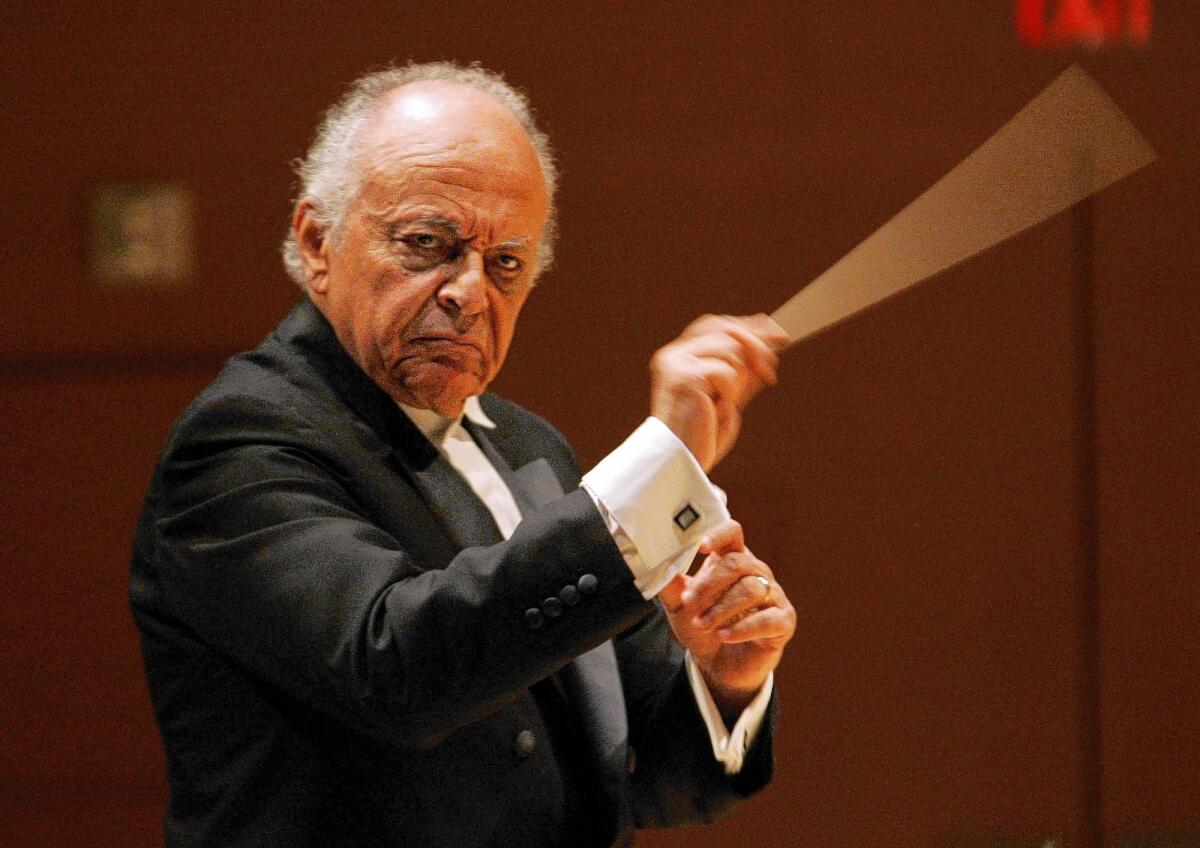Lorin Maazel dies at 84; world-renowned conductor

- Share via
The review was glowing.
Conductor Lorin Maazel held every player in the Los Angeles Philharmonic in his thrall. He strode onstage at the Hollywood Bowl “with a swing and determined vigor that gave evidence of his firm intention,” a Times reviewer wrote. When Maazel launched into Tchaikovsky’s tempestuous “Marche Slave,” his stick technique was convincing, his beat definitive, his presence imposing.
That was in 1939, when he was 9.
In the 75 years that followed, Maazel became known as one of the world’s indisputably great conductors, holding top posts with the Vienna State Opera, the Cleveland Orchestra and the New York Philharmonic, among others. Sometimes accused of arrogance, he was never thought of as less than brilliant and obsessively hard-working; over the course of his career, he conducted an average of two concerts a week for more than 70 years, leading performances by more than 200 orchestras around the world.
Maazel died Sunday at his home in Castleton, Va. He was 84.
His death of complications from pneumonia was confirmed by officials of the Castleton Festival, a summer music program he and his wife, Dietlinde Turban Maazel, ran on Castleton Farms, their 550-acre estate.
Maazel was “absolutely brilliant and deeply complicated,” said Deborah Borda, president and chief executive of the Los Angeles Philharmonic.
“He was partly isolated by his own profound genius and his sense of musical rectitude,” said Borda, who was managing director of the New York Philharmonic from 1990 to 1999. “He didn’t shy away from difficult decisions or pursuing his own aesthetic.”
While praising Maazel’s technical virtuosity, some of his critics called him cold and uncompromising. Maazel, who could be as kind to his musicians as he was short with the press, shrugged it off.
“What folks … define me as is their problem, not mine,” he said in a 2012 PBS interview. “If you use that word ‘imperious’ to my kids, they’d laugh you off the property. It’s just not who I am.”
At the festival he hosted on his rolling farmland, Maazel mentored dozens of young classical musicians. The event showed the formidable Maazel in a warm, down-home light that “few people suspected was there,” the Washington Post said in 2011. “Its can-do, homemade spirit smacks of the fresh-faced naivete of Judy Garland and Mickey Rooney: ‘Let’s put on a show! There’s a barn out back!’”
Maazel spoke at least six languages and possessed a photographic memory that allowed him to conduct without scores. He was the first American conductor to draw a seven-figure salary, the first to play at the Wagner festival in Bayreuth, Germany, and the first to bring a U.S. orchestra to reclusive North Korea.
Although hailed by some as cultural diplomacy, the New York Philharmonic’s 2008 trip to Pyongyang also drew its share of critics. Always forthright in a musical realm governed by formality, Maazel was glad to respond.
“These guys were talking about the horrors of insane Communist repression,” he told the New York Times in 2009. “I mean, I was there before these guys were born, in Moscow, Sofia, Budapest, Prague, Warsaw. I’m talking about 40 years back, when these guys were still in diapers. I saw that world. I know more about it than they will ever know.”
Born in Paris on March 6, 1930, to American parents, Lorin Varencove Maazel grew up in a musical family. His grandfather was a violinist at the Metropolitan Opera in New York, and his mother, Marie, was a pharmacist who played the piano. His father, Lincoln Maazel, was a character actor and tenor who died in 2009 at 106.
In 1932, the family moved to Los Angeles, where young Lorin played a tiny violin with the Karl Moldrem Hollywood Baby Orchestra, an ensemble that performed at department stores and charity events.
At 7, he studied conducting under Russian maestro Vladimir Bakaleinikoff.
At 11, he guest-conducted Arturo Toscanini’s famed NBC Symphony Orchestra. At his first rehearsal, resentful musicians old enough to be his grandfather greeted him with lollipops in their mouths.
After his family followed Bakaleinikoff to Pittsburgh, Maazel studied at the University of Pittsburgh, moonlighting as a violinist with the Pittsburgh Symphony.
As a conductor, he found a home in Germany, with Deutsche Opera and the Berlin Radio Symphony. In 1972, he took the directorship of the Cleveland Orchestra, becoming conductor emeritus in 1982 when he started a troubled tenure with the Vienna State Opera.
Having gone in announcing that the opera would “again be led in the fashion of Mahler and Strauss,” he ran into stiff opposition and quit after two years.
He served as director of the New York Philharmonic from 2002 to 2009. Musicians praised the maestro’s musicianship, but some suggested he was too detached.
But he could also devote himself thoroughly to the music as he saw it.
Leading the Los Angeles Philharmonic in a 2008 performance of Benjamin Britten’s “War Requiem,” Maazel chose to use a second conductor for the complex work that involves both a full orchestra and a chamber orchestra.
“Many big-time maestros wouldn’t dream of having a second conductor,” the L.A. Phil’s Borda said, “but Lorin Maazel felt it was the only way to fully realize the score.”
In addition to his wife, Maazel is survived by three sons and four daughters. Two previous marriages ended in divorce.
Twitter: @schawkins
More to Read
Start your day right
Sign up for Essential California for the L.A. Times biggest news, features and recommendations in your inbox six days a week.
You may occasionally receive promotional content from the Los Angeles Times.







